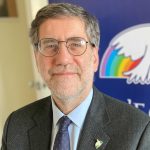The World Tribune spoke with Andrea Bartoli, Ph.D., an international conflict resolution expert, about his thoughts on the war between Russia and Ukraine, the use of violence in conflicts and his belief that peace is possible. He currently teaches at Seton Hall University, is a visiting fellow at the Columbia University’s Advanced Consortium on Cooperation, Conflict and Complexity (AC4) and a member of the Steering Group of the Global Action Against Mass Atrocity Crimes (GAAMAC). Dr. Bartoli also serves on the board of trustees of Soka University of America in Aliso Viejo, California.

World Tribune: Thank you, Dr. Bartoli, for speaking with us. We understand that your first encounter with Daisaku Ikeda and his works was at Columbia University in 1996. Can you tell us about that time?
Andrea Bartoli: I was at Columbia University working on conflict resolution when Daisaku Ikeda lectured there.[1] Out of curiosity, I attended his lecture.
I was intrigued by Dr. Ikeda’s insistence on global citizenship. There was an interesting mix of language that he was using. Wisdom, courage and compassion—these are words that are not usually associated with international relations. The concept of global citizenship he introduced is an idea, but it’s also a very practical choice that each of us can make. You don’t have to wait for somebody to formally establish a passport for global citizens. You can become a global citizen by accepting the discipline of being a global citizen and cultivating these qualities of wisdom, compassion and courage in your own life. That nuance was clear in Dr. Ikeda’s Columbia University Teachers College lecture, and this is why I became interested. I started following Dr. Ikeda’s writings, and went back to his work on value creation. This was the beginning of my ties with Daisaku Ikeda and the Soka Gakkai.
WT: The world is watching with horror the events unfolding in Ukraine. As an expert in conflict resolution, what are your thoughts about the current events?
Dr. Bartoli: The situation between Russia and Ukraine is important for all of us. In many ways, it is a product of centuries of historical development. If you have an understanding of the world that others are always out to get you, a world in which everybody is against everybody else, then it makes sense to have a highly defensive, highly conflictual approach to your relationship with others. It is the most prudent way to respond to any threat—it is better to be protected, it is better to be alert.
But what we see is that, as human families, we need that attitude less and less if we are to build patterns of cooperation. If we recognize one another as global citizens then we don’t need to use violence and threats, and there is no need for a defensive posture.
We need to hope that between Ukraine and Russia, a political attitude of dialogue and participation will prevail over the temptation that power is the only way to resolve the issue.
WT: The war in Ukraine is a macro event that is impacting the world, but we all have personal conflicts that can get out of hand. What do you teach others about conflict resolution that can be applied to our daily lives?
Dr. Bartoli: My simplified answer to that question is that conflicts and violence tend to be associated with righteousness. In many ways, the violent one always thinks they have a good reason to be violent. The violent one thinks that he has been provoked and that something wrong has been done to him.
But it is very addictive. Violence takes hold of those who are using it. Those who are using it believe that they are right, but actually violence is controlling them. It is forcing them to do things that are against human rights, against the other, even against themselves.
I find Dr. Ikeda’s insistence on personal responsibility for nonviolence really important because fundamentally, violence is always trying to control somebody. We should have control over our lives, emotions and bodies, but violence is an illness in which you lose that control. The result is that you start hurting people, insulting people, ruining people and ultimately killing people.
It’s important for us to invite each other to the responsibility of choosing self-restraint so that peace is given a chance. Peace can be given a chance through each of us taking responsibility to become global citizens. There is an important relationship between the responsibility of each of us and the result globally.
WT: What is the role of faith organizations in promoting peace?
Dr. Bartoli: Humanity is in many ways emerging as humanity. As a devout Catholic, I’m familiar with engaging religious communities toward a common goal. I think it’s important to collaborate as faith organizations for the betterment of our world.
WT: When events like these occur, it can dim people’s hopes for peace. Do you think that world peace is possible?
Dr. Bartoli: Absolutely. When we look at the long trend, humanity is actually doing better. Even though right now we have weapons that can destroy the entire planet in a moment, we are not using them. We are showing restraint. We can focus on the capacity of people to control themselves and choose real peace. The key is real people choosing real peace.
Voices of Hope
Kosen-rufu Here Impacts Peace in Ukraine
Tsuneo Yabusaki is the administrative manager for the SGI Office for U.N. Affairs and the New York Zone men’s leader. His younger brother, Yoshio, lives in Kyiv, Ukraine, where he supports SGI members throughout the country.
by Tsuneo Yabusaki
New York
I had a quintessential turning point while studying peace education at Teachers College, Columbia University. I don’t remember which country or war, but I saw a photo of a mother, no emotion on her face, carrying her dead child in her arms. That photo was burned into my heart and solidified my vow to fight for world peace wherever I am.
Recently, that fight has hit close to home. For the past decade, my brother has lived in Kyiv, the capital of Ukraine, with his wife and family. Given the current situation there, I’m chanting serious daimoku for their safety. But instead of feeling powerless and consumed by my inner weaknesses, I’m focused on cherishing the person right in front me with the conviction that, because we are all connected through the Mystic Law, my actions for kosen-rufu here will directly impact peace in the Ukraine.
Recently, my brother told me that though people there are suffering, the youth are standing up with tremendous courage. I’m determined to directly translate the hope and determination I feel for the youth in the Ukraine to the youth I meet here in New York, believing in the tremendous mission that every single one of them has for world peace.

Peace is Possible
Marina Inoue is a freshman at Soka University of America from Vladivostok, Russia. She speaks to the World Tribune about her hopes for peace.
by Marina Inoue
Aliso Viejo, Calif.
When I initially heard the news of what was happening in Russia and Ukraine, I was shocked. There was a lot of panic and fear—the fear of war, fear for the people in the epicenter of the conflict and fear for the people of Ukraine. I also felt powerless because I wasn’t there, and I felt that I could not change anything.
Quarrels started between some of my friends because of differences in political views in the information each person was being exposed to. I realized that there was no meaning in trying to understand the politics. We all wanted the same thing—peace, not war. I’m doing my best to support my friends back at home who are anxiety-ridden with worry, fear and concern for the people of Ukraine.
I was born into a family that practices Nichiren Buddhism with the SGI, but I’ve never challenged something of this magnitude with faith. My roommate and I decided to hold a chanting session for the sake of world peace and peace in Ukraine. Family and friends from Russia, my SGI district and school joined the chanting session. I’m so moved by the support I’ve received from my SGI family, and I will continue to chant for peace in the world and support the people around me.
Do I think that peace is possible? My hope has not yet died, and I am determined to contribute to make it possible. My dream is to go back to Russia after graduating and open my own school to foster many more global citizens who can change the world for the better.
References
- Daisaku Ikeda presented the lecture “Thoughts on Education for Global Citizenship” at Teachers College, Columbia University on June 13, 1996, in New York. In his lecture, he outlined three qualities of global citizenship—wisdom, courage and compassion—offering a universal lens from which people could both perceive a harmonious world and achieve it. For the full lecture, see A New Way Forward, p. 85. ↩︎
You are reading {{ meterCount }} of {{ meterMax }} free premium articles

